She tried convincing herself it was delirium, the fragmented whisper of a dying man. Yet the words had sounded measured, deliberate, and almost rehearsed. They echoed louder than the condolences murmured at the funeral, unsettling her more than the black suits and fading flowers around his casket.
Back home, unease shadowed every corner. A key taped beneath his desk. Bank statements hidden in the spine of an old novel. Even ordinary memories replayed differently now, tinged with secrecy. It was as though he had left her a puzzle, daring her to uncover the truth.
His last words clung to her like a curse. “I’m sorry. You’ll see.” Moments later, his hand had slipped lifelessly from hers. As the monitors went silent, grief rose in her chest, but confusion carved deeper. What secret had he carried into death, leaving her to decipher?
Her name was Margaret Hale, though everyone called her Maggie. At sixty-two, she thought she knew every shade of her husband’s soul. Daniel Hale had been steady and reliable, a man who folded his shirts neatly and paid bills on time. Yet his final words cracked that certainty.

In the quiet of the house they had shared for four decades, Maggie moved like a stranger. Daniel’s absence hung heavy in the curtains, in the echo of his laugh. She tried to cling to the ordinary—his slippers by the door and glasses on the counter.
But grief sharpened into something else. On the third day, while sorting through his papers, she noticed a glint of metal beneath the desk. Her fingers scraped against tape. A small brass key fell into her palm, cold and foreign. Daniel had never mentioned a lockbox.

Maggie frowned, her heart stuttering. She tried every drawer, but none matched. Then she spotted the thick spine of an old novel on the shelf. She had not seen it in ages. It was Daniel’s copy of Great Expectations. Between its pages lay folded bank statements, yellowed but carefully hidden.
The numbers startled her. Transfers to accounts she didn’t recognize, balances she couldn’t fathom. Daniel had always claimed they lived modestly, just scraping enough to stay comfortable. But these papers told another story—a trail of secrecy stretching back years. Maggie’s breath caught. Had he deceived her?

At night, sleep refused to come. Daniel’s last words circled endlessly: “I’m sorry. You’ll see.” The fragments tangled with the rustle of paper, the weight of the key, the images of figures she couldn’t explain. Her mourning now carried an edge of suspicion she wished she could ignore.
By the week’s end, curiosity triumphed over fear. Maggie slid the key into her handbag, slipped on her coat, and whispered a promise to Daniel’s photograph on the mantel. “If this is your puzzle,” she murmured, “I’ll solve it. Even if I don’t like the answer.”
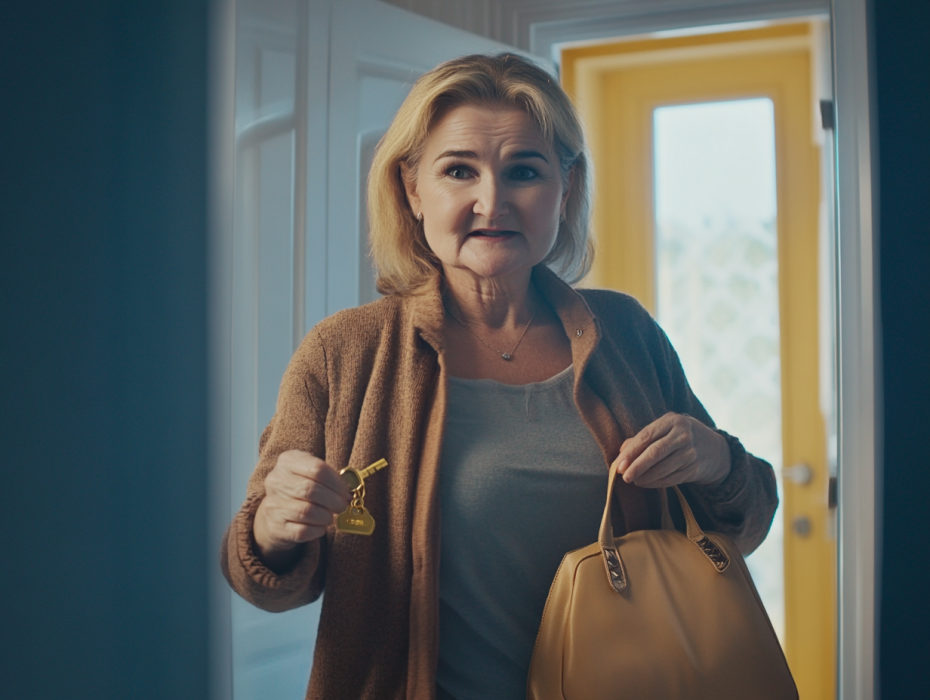
The following morning, Maggie carried the brass key into town. She stopped at the bank Daniel had always used, her pulse racing as she pushed open the heavy glass door. The lobby felt colder than usual, the kind of place where answers whispered but rarely comforted.
At the counter, she hesitated, then slid the key across to the clerk. “I… found this among my late husband’s things,” she said softly. The clerk’s polite smile faltered. With a nod, he disappeared, returning moments later with a manager who requested she follow him.
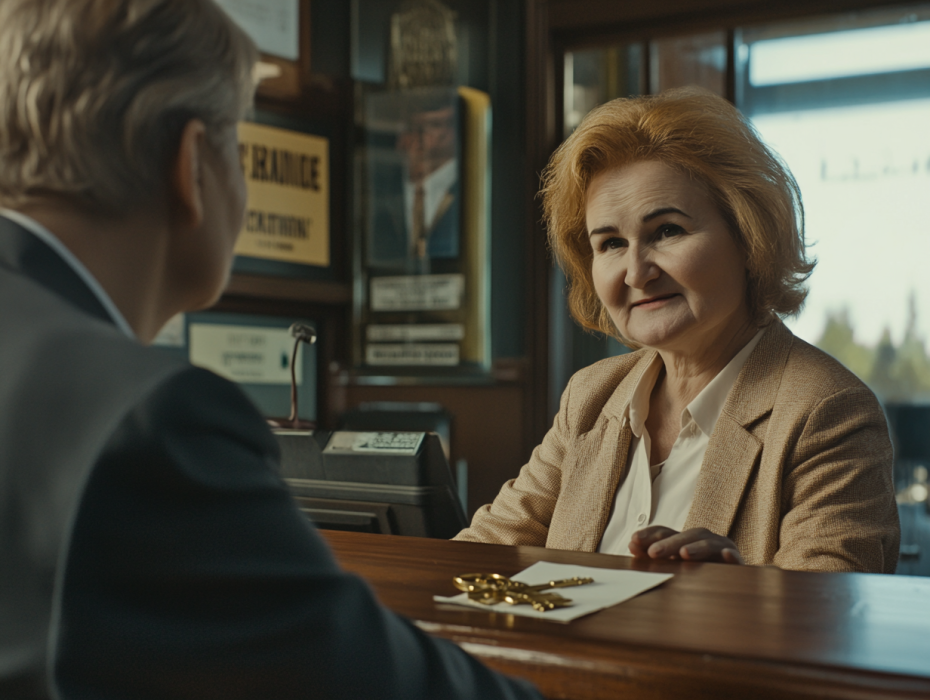
In a small office, the manager explained that Daniel had arranged for her to be contacted. “There are documents in storage,” he said carefully. “We require identification and your signature to release them.” Maggie’s hands trembled as she produced her driver’s license. The process felt ceremonial.
The manager returned with a sealed envelope, thick and weighty. Maggie clutched it, her heart hammering. She almost tore it open there, but pride stiffened her spine. Instead, she carried it home like contraband, placing it on the dining table where Daniel once read the morning paper.
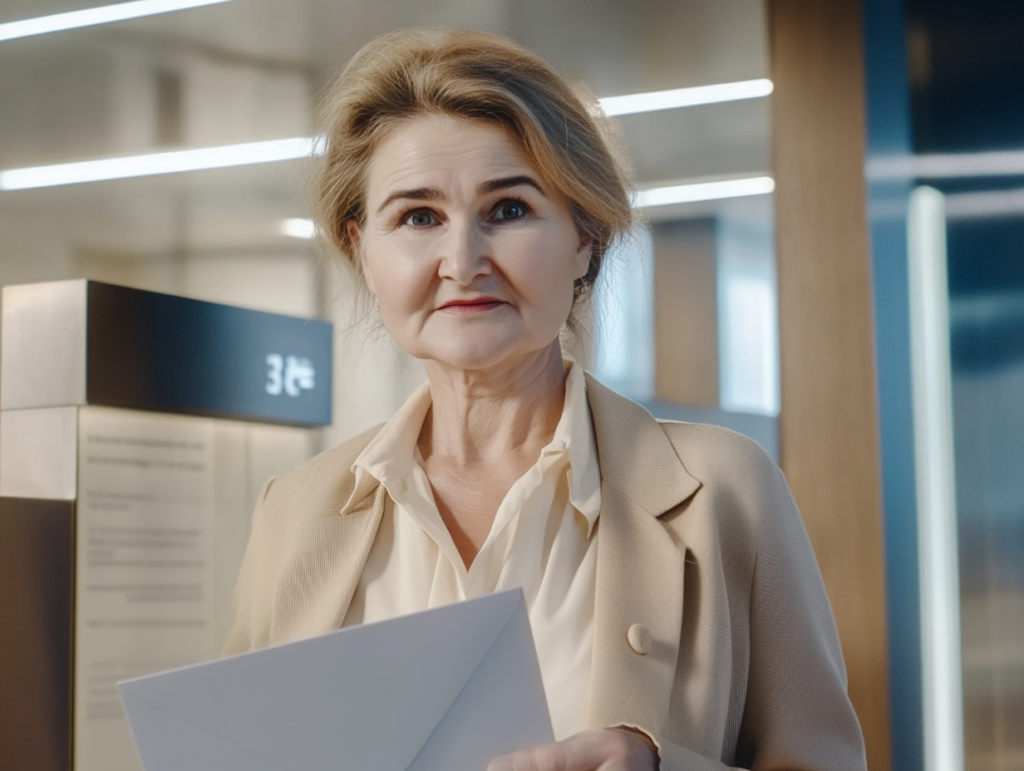
For hours, she circled the envelope, making tea she didn’t drink, folding laundry that could’ve waited. Finally, she broke the seal. Inside was not an explanation, but another clue: a business card for a law firm and a note in Daniel’s handwriting — “Just trust me.”
Maggie collapsed into the chair, disbelief flooding her. Why would Daniel involve lawyers? He had always dismissed legal matters as unnecessary expenses. A flicker of dread crept in. Had he left debts? Had he signed something without telling her? The words “I’m sorry” rattled louder than ever.
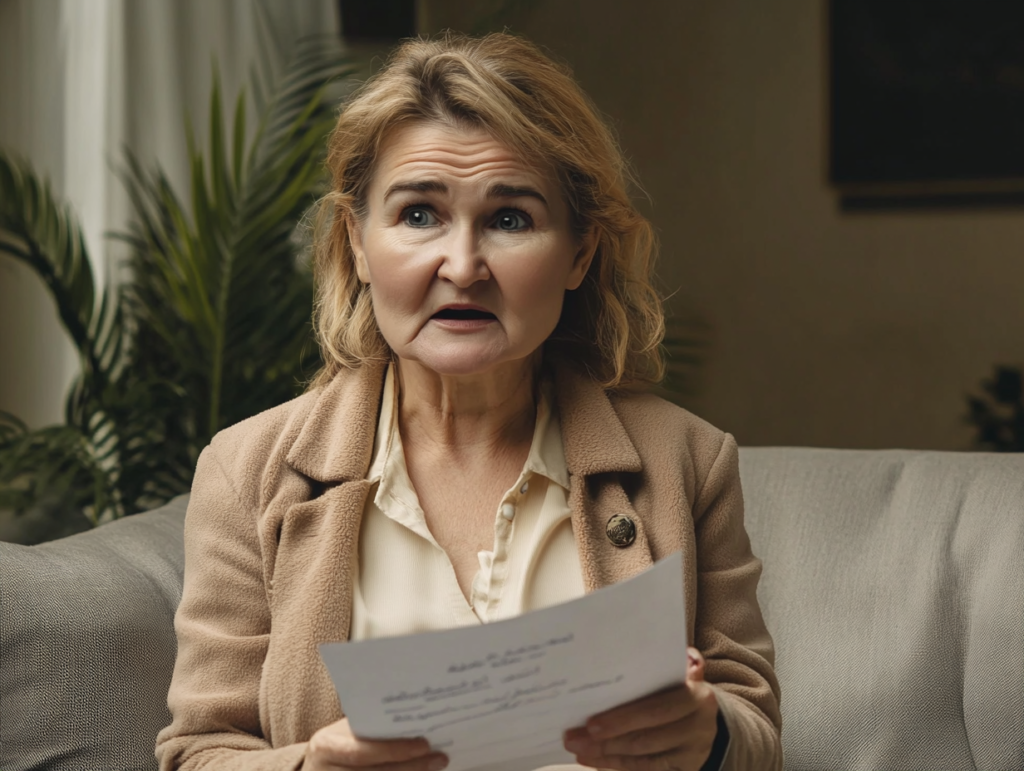
The next day, dressed in her best coat, she visited the address on the card. The law firm’s office occupied the top floor of a tall brick building. The receptionist, too polite to show surprise, led her to a room where a suited man introduced himself as Mr. Carver.
“Your husband was a client of ours for many years,” Mr. Carver said gently. He opened a leather folder, the pages thick with legal jargon. “Certain matters were prepared in strict confidence. We’ve been instructed to wait until his passing before contacting you.” Maggie’s palms dampened.

Mr. Carver was a man of few words, offering instead more papers to sign. Maggie felt the walls close in. She pressed for answers, but he only smiled sympathetically. “All in good time,” he said. She left the office more unsettled than when she arrived, the folder tucked under her arm.
Back home, Maggie spread the folder on the table. Most of it was indecipherable, lines of numbers and signatures. Yet at the back, she found an appointment slip with Daniel’s name scrawled in neat ink, beside the address of a storage facility. Her pulse quickened. Another secret was in store for her.

The storage facility sat on the edge of town, a row of metal doors stretching like quiet sentinels. Maggie presented the slip to the attendant, who checked records, then guided her down the corridor. The key in her hand felt heavier with every step toward Daniel’s secret.
Door thirty-four creaked open reluctantly. The unit smelled faintly of dust and motor oil. Cardboard boxes lined the walls, stacked neatly as though Daniel had visited often. Maggie stepped inside, her breath shallow. This seemed deliberate and curated. He had built this hidden room carefully.

She knelt by the nearest box, lifting the lid with trembling fingers. Inside were ledgers filled with numbers, neat columns in Daniel’s handwriting. Each page carried dates spanning decades, every calculation precise. Maggie frowned, running her fingers along the ink. He had kept accounts she had never known existed.
Another box revealed envelopes of cash, bundled and labeled. Maggie’s stomach turned. Was this money he had hidden from her? She thought of neighbors whispering about secret lives, of relatives who hinted Daniel had been “too good with numbers.” Suspicion swelled, poisoning her grief with doubt.

Yet mixed among the papers were photographs: birthdays, anniversaries, even candid moments she didn’t remember being captured. Daniel had tucked these between files as if anchoring the cold numbers to warmth. Maggie clutched a photo of them laughing by the lake, tears staining the edges.
At the back of the unit sat a small lockbox, the brass glinting faintly under fluorescent light. Maggie used the key. Inside, neatly folded, was a sealed file labeled in Daniel’s handwriting: For Margaret. The sight stole her breath. She pressed the folder to her chest, unwilling to open it there.
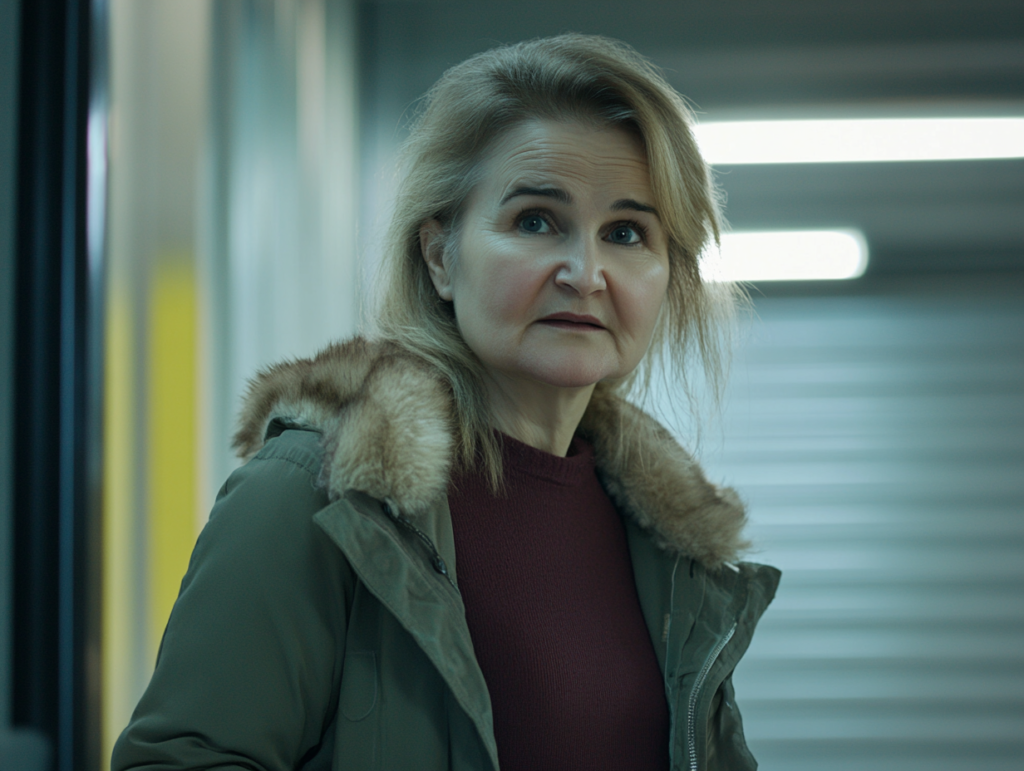
She locked the unit again, heart pounding. The folder remained heavy in her handbag as she drove home. She couldn’t shake the fear that inside lay proof of betrayal: another family, debts, or some criminal enterprise. Daniel’s final words returned, both promise and threat: “I’m sorry. You’ll see.”
Back at the house, she placed the folder on the dining table. Hours passed as she circled it, each tick of the clock stretching her nerves. Finally, she broke the seal. Inside, she found a stack of instructions. They were not answers, but a trail leading further still.

The documents referenced bank accounts Maggie had never heard of, along with a note in Daniel’s hand: “Go to Citizen Bank. You’ll learn more there.” Beneath the note lay the key to a safety deposit box. Her pulse quickened. The mystery deepened instead of resolving. She never knew Daniel had an account with this bank.
Exhausted, Maggie slumped into Daniel’s old armchair, folder on her lap. She closed her eyes, torn between dread and fragile hope. What if he had betrayed her? What if he hadn’t? Only one path remained: follow his instructions, wherever they led. Tomorrow, she would face the truth.

Morning light spilled across the driveway as Maggie clutched the safety deposit key. The town seemed unchanged, yet she felt herself moving through a different world—one Daniel had built in silence. Each step toward this bank tightened the coil of fear in her chest.
Inside, the manager greeted her with a reserved nod. “Mrs. Hale, we’ve been expecting you,” he said. He led her down a long corridor lined with heavy steel doors. The air smelled faintly metallic, like secrets sealed too long. Maggie’s hands shook as she followed.

The manager opened a vault door, guiding her to a small private room. “Take your time,” he said gently, placing a slim box on the table. Maggie nodded, barely able to breathe. Alone now, she slid the key into the lock, her heart pounding in her ears.
The lid creaked open. Inside lay more documents, bound in neat folders. Maggie sifted through them—wills, notarized agreements, financial ledgers thicker than any she’d seen. Her chest constricted. The scope of Daniel’s secrecy sprawled before her, vast and intentional. She whispered, “What were you hiding from me?”
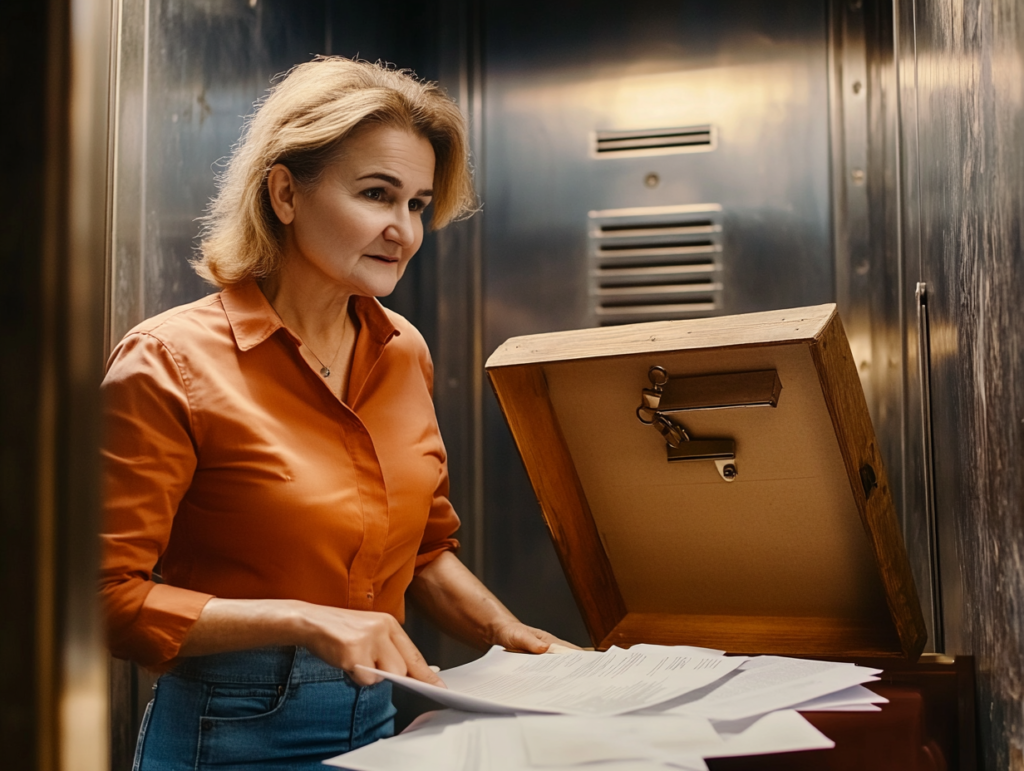
She found bank statements showing deposits over decades. Large sums moved quietly into a single trust account. Maggie stared at the numbers, too stunned to comprehend. How had Daniel, who claimed modest earnings, built something so immense? The possibility chilled her: crime, corruption, perhaps even betrayal.
Another envelope contained letters, not addressed to her but sealed with Daniel’s initials. She brushed her thumb over the paper, afraid to open them. Her mind raced—were these written to someone else, another woman, a hidden family? Tears blurred her vision as dread took root.
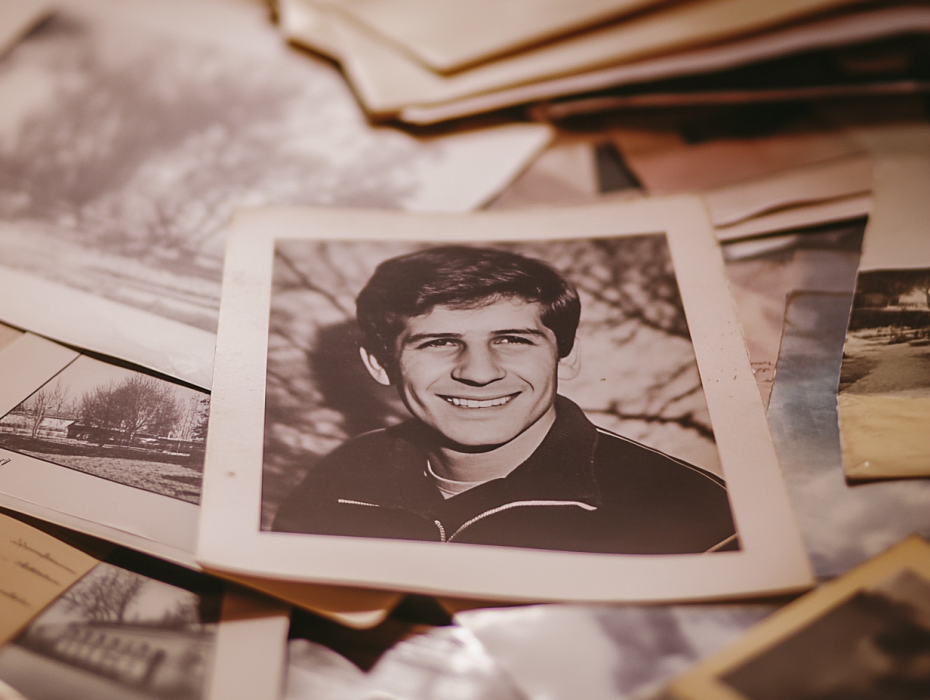
Yet tucked among the envelopes lay a photograph of Daniel alone, smiling softly, younger by decades. On the back, he had written in his neat script: “For the future, always for you.” Maggie pressed the photo to her lips, confusion and longing colliding.
The papers suggested meetings with financial advisers, lawyers, and accountants spanning years. Maggie had never known. Daniel had lived a quiet double life of appointments and signatures, hidden beneath their ordinary days. Every discovery cut her deeper. Was she his partner, or just someone he shielded from the truth?

When she returned the box, the manager gave her a look of sympathy, as though he knew she was unraveling. “Sorry, we’re not allowed to say more at this point,” he said softly. “We’ve been instructed to contact you again soon.” Maggie walked out into the daylight, clutching the folder like a wound.
At home, exhaustion claimed her. She sat in Daniel’s chair, folders spread across her lap, unanswered questions pressing like stones. His last words haunted her again: “I’m sorry. You’ll see.” She whispered back, broken and defiant, “Then show me, Daniel. Show me what you’ve done. Why all this secrecy?”

Word of Daniel’s debts somehow rippled through the family. At Sunday dinner, her sister-in-law leaned close, lowering her voice. “He was always secretive with money, Maggie. You sure he wasn’t hiding something from you?” Maggie stiffened, her appetite fading as whispers painted Daniel in darker shades.
Friends offered theories, each more unsettling than the last. Some suggested gambling. Others alluded to a possible mistress. Maggie forced polite smiles, but their words burrowed deep. Alone at night, she lay awake, replaying decades of conversations, wondering which moments had been true and which could have been a farce.

Maggie slammed a drawer shut, frustration boiling. Why couldn’t he have been honest while alive? Why leave her chasing shadows in grief? She pressed her forehead against the cool wood, whispering, “I did trust you, Daniel. Was it not enough?” Silence answered, heavy and suffocating.
She returned to the storage unit Daniel had rented years ago—the same place she’d found neat boxes of ledgers. This time, she was less tentative, more determined. The unit smelled of dust and rust; fluorescent light hummed. Boxes waited in parallel rows like patient witnesses.
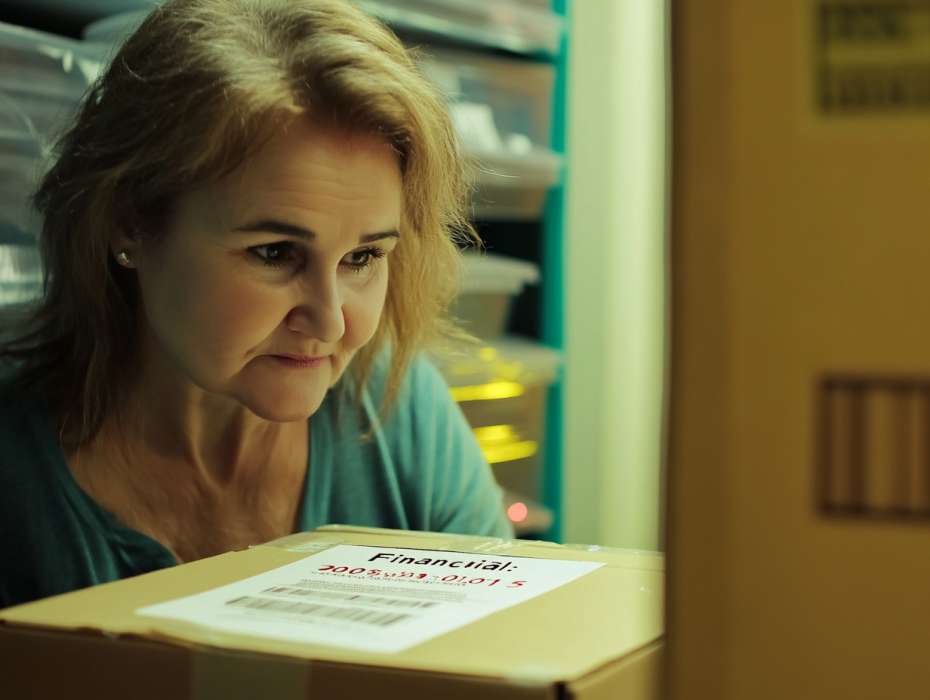
In a box labeled Financial — 2009–2015, she found old loan paperwork and, traversing the pages, a ledger showing the slow funneling of certain sums into an account named as a trust. Dates on the deposits stretched back a decade. He had been moving money for years, carefully, deliberately.
Mixed with loan notices, she found receipts of payments — a few months’ gap here and there where he’d made extra ones. It was as if Daniel had been catching up, paying down creditors when possible. The picture was messy: debt existed, but so did planning. Why not tell her? Why the secrecy?
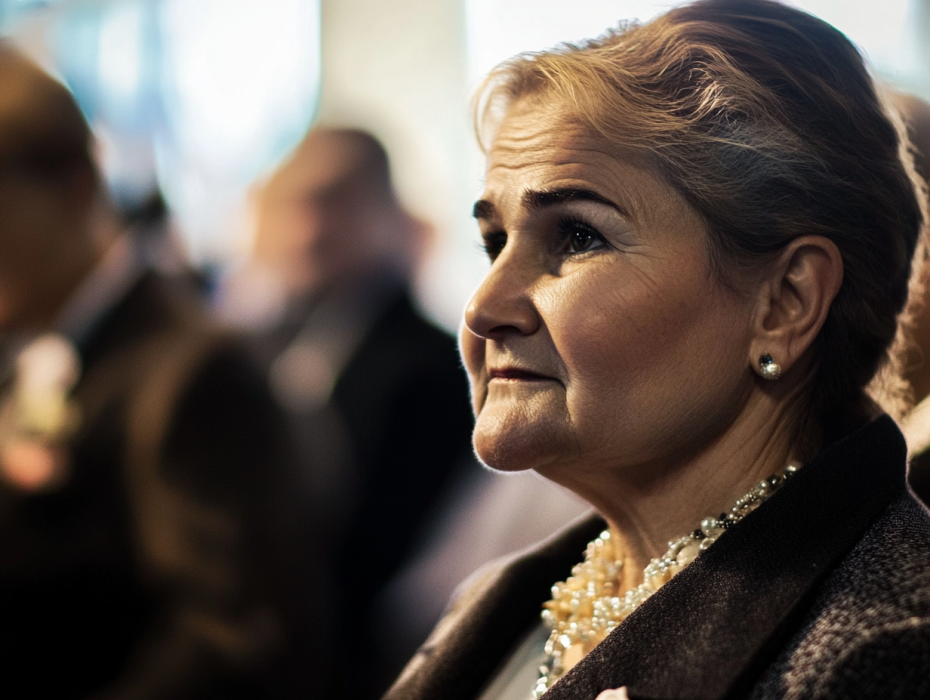
At the funeral, acquaintances murmured theories as they folded napkins. “Maybe he was ashamed he’d fallen into debt,” whispered a friend. Another suggested a secret lover. Maggie nodded at their condolences. She let the words behind her back wash over her like static.
Rumors intensified when an unfamiliar woman arrived, pale and reserved. She introduced herself politely—a Ms. Anne Carlisle, a colleague from Daniel’s work—and offered condolences. Her presence was small but seismic. Who was she? A worried relative? An old colleague? Maggie’s stomach folded over with the old ache of suspicion.

Neighbors nudged, and hushed theories spread. “She looked at the coffin as if she knew him longer,” someone observed. Maggie found herself watching Anne from the kitchen window, searching for signs of a second life. Anne’s visits were infrequent and formal, but their mere possibility sent Maggie into a spiral.
Night after night, she lay awake imagining Daniel slipping out to meetings, leaving her with only suppers and polite smiles. She recited his ledger entries until the numbers blurred. The key in her handbag felt like a verdict.

The following evening, Maggie invited her closest friend, Eleanor, for tea. Pouring nervously, she confessed the half-truths, the envelopes, the storage unit. Eleanor listened quietly, then said, “If it were me, I’d not know what to think.” Maggie’s teacup rattled against its saucer, dread hollowing her chest.
Eleanor’s candor was always blunt. She said, “Either he hid money illegally, or he had another family. You need answers.” Eleanor’s bluntness had always been a salve. This time it lit a fuse. Maggie found herself pacing toward answers she wasn’t sure she wanted.

That night, Maggie dreamed of strangers gathered at Daniel’s funeral, children who looked vaguely like him. She jolted awake, sweat dampening her nightgown. Was that what his last words meant? “You’ll see.” Her trust in their life together now felt as fragile as glass.
Days blurred together, filled with anxious pacing and unanswered questions. The trust documents on her dining table stared back like an accusation. Daniel’s absence no longer felt like mere grief. It was an unfinished conversation, a man reaching across the grave to taunt her with secrets.
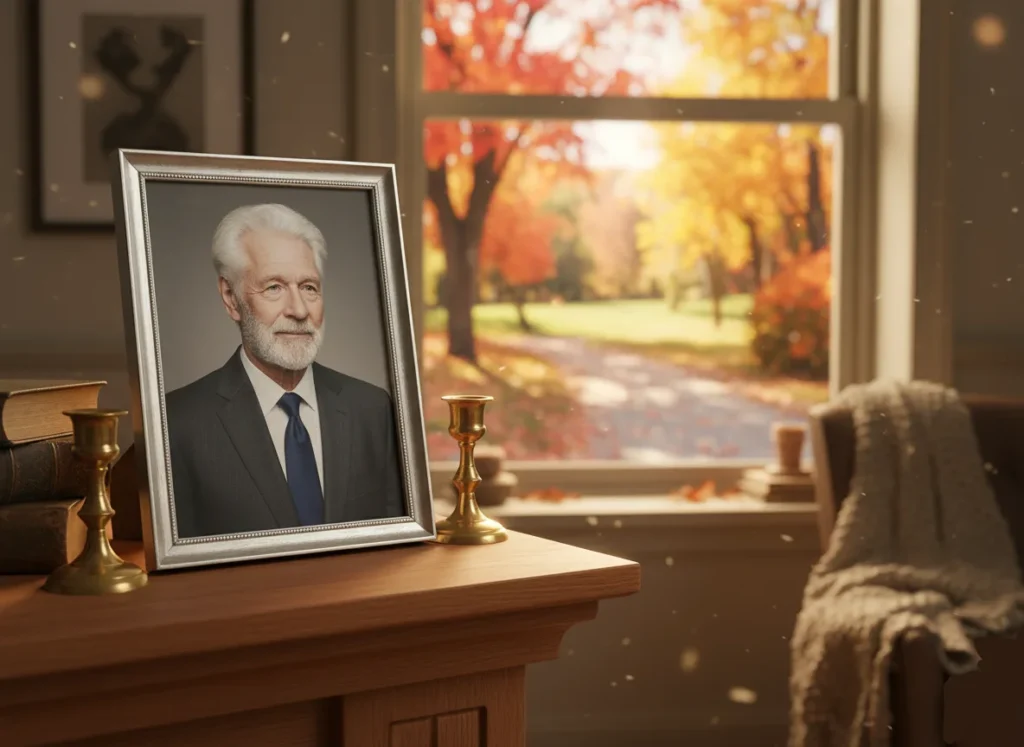
As summer bled into autumn, the town’s curiosity sharpened. Casual acquaintances became detectives. “Did he leave anything to you?” asked a woman at the post office. Maggie wanted to tell them to mind their own business, but instead she forced polite answers and retreated to the solitude of her kitchen, the binder like a bruise.
Finally, desperation pushed her back to Mr. Carver’s office. She demanded answers, her voice breaking. The lawyer only adjusted his spectacles. “Mrs. Hale, patience. Your husband left specific instructions. Everything will be revealed soon, but not before the proper time.” Maggie nearly screamed, but bit down her fury.

Leaving the office, she gripped the folder to her chest, breath trembling. She had reached her breaking point. Whatever Daniel had hidden, she would uncover it. No more envelopes, no more delays. She was prepared for betrayal, for ruin—anything but this endless torture.
That evening, Maggie sat alone in Daniel’s armchair, the envelope and ledgers spread across her lap. She whispered into the empty room, “Please, Daniel. I need to know.” Her voice trembled, half-plea, half-accusation. The ticking clock only deepened the silence.

In the evenings, she returned to the storage unit, cataloging files, cross-referencing ledger entries with dates. Each discovery urged two possible readings. One: Daniel was careful and methodical, shielding her. Two: he had a second life, obligations, and intimacies outside their marriage. The mind chose the unpleasant interpretation eagerly.
When an obscure creditor called the house asking questions about an old guarantee, Maggie’s hands turned to ice. The voice on the phone had the flat tone of people who work for money. After she hung up, she realized how fragile life and everything one took for granted was.

As autumn bled into winter, the town’s curiosity sharpened. Casual acquaintances became detectives. “Did he leave you anything?” asked a woman at the post office. Maggie wanted to tell them to mind their own business, but instead she forced polite answers and retreated to the solitude of her kitchen.
Each rumor tightened the knot in Maggie’s chest. She stopped trusting her own memories, piecing her marriage into stitches, wondering which ones were whole. Daniel’s laughter felt now like an echo in a large, empty room. She longed for a single clear answer: had he betrayed her, or had he protected her as he said?

As the months ticked by, claims did arrive. Letters from small lenders, a late claim from a contractor who said Daniel had guaranteed a job years ago, an ambiguous notice from a bank where a business Daniel had once advised defaulted. Each claim required verification and payment when valid. The trust’s funds were being counted against them.
Neighbors watched with morbid interest as Maggie met with trustees and lawyers. “Poor thing,” someone muttered. “He left her to pick up the pieces.” The narrative hardened in the public imagination: Daniel the secretive, Maggie the betrayed. Inside, she felt the words like stitches pulling at a wound that would not close.

At night, she dreamed of a ledger that opened like a mouth and swallowed their life whole. She woke with the sensation of someone else’s pulse in the house. Her life was turned upside down, and at times, she couldn’t help feeling bitterly angry toward the man who had left her.
Six months later, a former business partner called, demanding clarity about an unpaid guarantee. Mr. Carver negotiated, offering documentation and proof of past payments. The partner’s tone softened when faced with dated receipts and ledgers showing Daniel’s efforts to repay the obligation.

But gossip was less rational than the claims. At a family gathering, someone suggested Anne Carlisle might be a claimant. “You should ask her directly,” suggested the sister in law, with a sly smile. Maggie hesitated, then, with a tremor in her voice, invited Anne to tea, desperate for the simplest of truths: who was she?
Anne arrived with a small wrapped loaf and quiet eyes. She was in her fifties, measured and unobtrusive. Over cups of tea, she explained she had once worked with Daniel on a local charity project. “We lost touch,” she said, “but he helped my niece get a job once.” There was no melodrama. Hers was the level tone of someone who had been asked to prove nothing.

Maggie listened, relief twisting into shame. She had imagined a rival in Anne’s measure, a woman at the center of a secret life. The truth was less dramatic, more ordinary. But the shadow of suspicion the town had laid over Daniel’s memory would not be so easily brushed aside.
Finally, she returned to the bank one morning, almost a year after Daniel’s death, exhaustion painted under her eyes. The manager greeted her gravely, as though expecting her. “Mrs. Hale,” he said, “we’ve received notice from Mr. Carver. The time has come. There’s one last box for you to view.”

Maggie followed him into the vault again, her steps unsteady. The small chamber swallowed her as the steel door closed. Another box sat waiting on the table. This time, there was no hesitation. She unlocked it quickly, her breath sharp, ready for answers, no matter how devastating.
Inside lay a stack of bound papers and a single sealed envelope marked For Margaret — Final Instructions. Her hands shook as she pulled it free. The scent of Daniel’s handwriting— that familiar ink and those neat strokes—almost undid her. She held the envelope with shaking hands.

Inside the final box lay a thick stack of documents. Maggie’s breath caught as her eyes fell on the first page: a trust deed in her name. The figures blurred through tears — a sum so large it felt impossible, quietly amassed across decades without her knowledge.
Tearing it open, she unfolded a letter written in Daniel’s steady script. “My Maggie,” it began, “if you’re reading this, I’m gone. I’m sorry for the secrecy. I know you must have feared the worst. I’m sorry I made you wait so long.”

Her throat constricted as she read on. “It was not because I wanted to hide from you. I hid everything to protect you. In my life, I made many wrong choices. Some, even before I knew you. But I couldn’t drag you into a mess of my making.”
The letter continued, “With Carver’s help, we came up with a plan so that the trust I have left in your name will not be claimed by debtors. After the twelve-month period, claimants can no longer make demands upon my money. However, we needed to ensure that you would not inadvertently reveal this legal loophole to anyone.”

The page went on, then finally closed with: “I could not allow you to spend your life in poverty or misery. I set this wall to give you time—for the law to clear our debts, for rumor to die down, and so that what remained would be yours without fear or lawsuit. Forgive me.” He signed it, and beneath his signature, in smaller letters: “I loved you. I love you still.”
Tears blurred her sight. Beneath the letter lay documents confirming a trust fund in her name, accounts carefully nurtured over decades. The vast sum stunned her. Daniel, who’d always claimed modest means, had built a hidden security for her—a legacy disguised in secrecy.

Her hands shook as she flipped through the papers. Every ledger confirmed it: Daniel had been building this for years, slowly, steadily. While she believed their life was modest, he had been planning quietly, shielding her from both the burden and the temptation to spend it.
The manager cleared his throat gently. “Your husband was adamant,” he explained. “He insisted this sum remains untouched even during his illness. He feared you might exhaust it on treatments with no hope of success.” His words carried no judgment, only reverence for a man who had prepared everything carefully.

Relief arrived with a curious tenderness. The anger she had nursed for months softened into something warm and complicated. Daniel had planned to protect her, navigating a legal minefield, calculating the risk of claims and the sting of publicity. His secrecy had been a strategy, born of love and fear in equal measure.
When she signed the final paperwork, Maggie felt absurdly foolish and deeply grateful for the legal paperwork that had once felt like a chain. The instruments of law that had once frustrated her now served as the scaffolding of a future Daniel had intended: secure, deliberate, and meaningful.

Standing alone in the twilight, Maggie folded Daniel’s letter and placed it in the old oak box with the other relics of their life. She whispered into the quiet room, “I’m sorry too. But now I see.” The apology felt like a key turning, unlocking peace.
